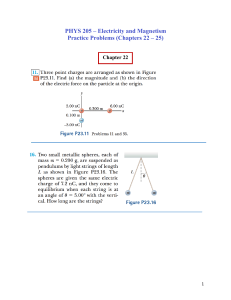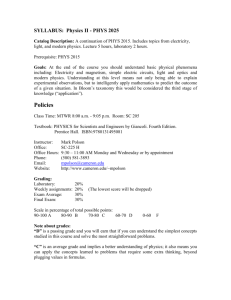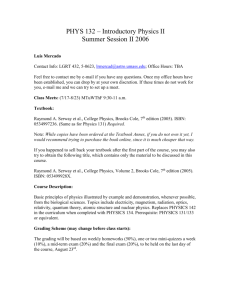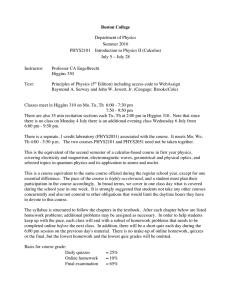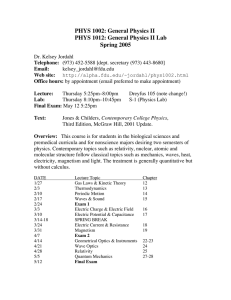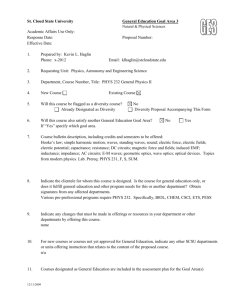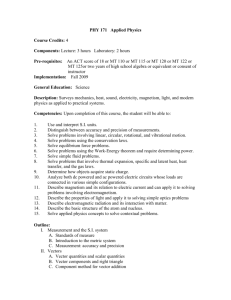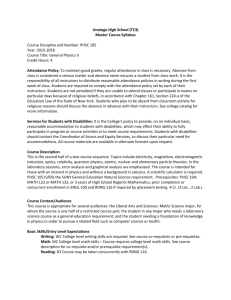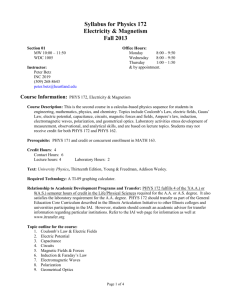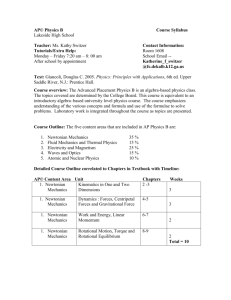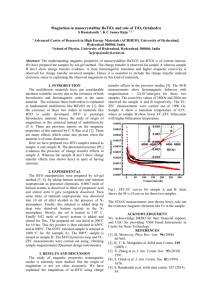Grading and Attendance Policy for PHYS 1215
advertisement
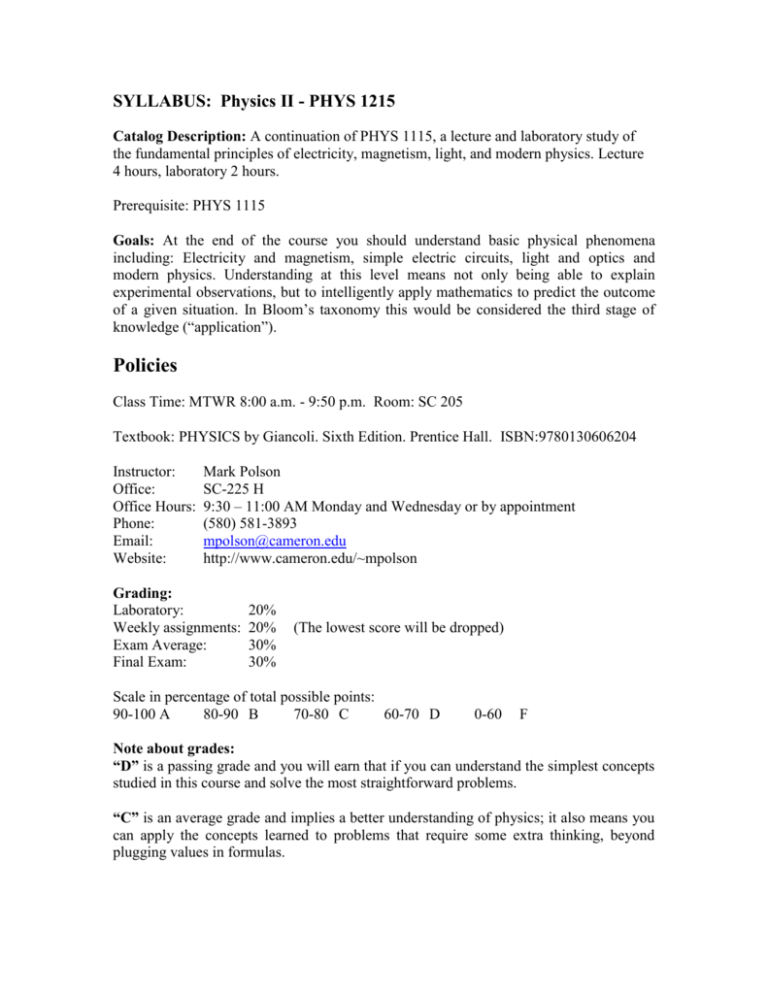
SYLLABUS: Physics II - PHYS 1215 Catalog Description: A continuation of PHYS 1115, a lecture and laboratory study of the fundamental principles of electricity, magnetism, light, and modern physics. Lecture 4 hours, laboratory 2 hours. Prerequisite: PHYS 1115 Goals: At the end of the course you should understand basic physical phenomena including: Electricity and magnetism, simple electric circuits, light and optics and modern physics. Understanding at this level means not only being able to explain experimental observations, but to intelligently apply mathematics to predict the outcome of a given situation. In Bloom’s taxonomy this would be considered the third stage of knowledge (“application”). Policies Class Time: MTWR 8:00 a.m. - 9:50 p.m. Room: SC 205 Textbook: PHYSICS by Giancoli. Sixth Edition. Prentice Hall. ISBN:9780130606204 Instructor: Office: Office Hours: Phone: Email: Website: Mark Polson SC-225 H 9:30 – 11:00 AM Monday and Wednesday or by appointment (580) 581-3893 mpolson@cameron.edu http://www.cameron.edu/~mpolson Grading: Laboratory: Weekly assignments: Exam Average: Final Exam: 20% 20% 30% 30% (The lowest score will be dropped) Scale in percentage of total possible points: 90-100 A 80-90 B 70-80 C 60-70 D 0-60 F Note about grades: “D” is a passing grade and you will earn that if you can understand the simplest concepts studied in this course and solve the most straightforward problems. “C” is an average grade and implies a better understanding of physics; it also means you can apply the concepts learned to problems that require some extra thinking, beyond plugging values in formulas. “B” is a very good grade and implies that you understand most of the material covered in the course and are able to apply it to many situations, simple and complex. An “A” in Physics II is outstanding and means that you have a good understanding of all aspects of the course and you can apply it to most situations. If you get an A in this course you are expected to do very well in any standard test of the subject (GRE, MFAT, MCAT, etc) and you are expected to remember most of the material the rest of your career. To earn an “A” in this course you typically have to study every week and solve practice problems in every chapter. In practical terms it also means that you will need to do well on assignments, quizzes, and tests, you will need to write all your lab reports on time and you will need to do well on the final exam. An average of 89.9 is a B, not an A. You need 90.0 out of 100 to get an A. Remember that your instructor does not “give” grades, you earn your grades. Contents: Electricity: [Chapters 16, 17, 18 and 19 in your textbook] Charge, potential, fields, currents and circuits. Volts, amps, thunderbolts, capacitors, camera flash, flash memory, light bulbs, batteries and superconductivity. Magnetism [Chapter 20] Earth’s magnetism, MRI, the magnets on your refrigerator, levitating trains and frogs… Faraday’s law [Chapter 21] Electric generators, car alternators, transformers and hard disks. Electromagnetic waves [Chapter 22] Maxwell’s laws, your cell phone antenna, your car radio antenna, your TV antenna, why the sky is blue, why the sun looks red at sunset, so the moon at moonset. Light and optics [Chapters 23, 24 and 25] Mirrors (rear view, make-up, dress, convenience store), fiber optics, magnifying glasses, microscope, telescope, projector lens, cameras and correction glasses. Modern Physics[Chapters 26-28, 30] Relativity theory, Quantum theory, and Radioactivity. Students with disabilities It is the policy of Cameron University to accommodate students with disabilities, pursuant to federal and state law. Students with disabilities who need classroom accommodations must make their requests by contacting the Office of Student Development at (580) 581-2209, North Shepler Room 314. Comments: This is a very ambitious course that covers a lot of ground in 16 weeks. It is a 5 credit course that will ask time and effort on your part. The reward is worth the while because you will get a better understanding of phenomena that are ubiquitous in our world and make possible the technology that is changing the way we live. Tentative Schedule Week 1 2 3 4 5 6 7 8 9 10 11 12 13 14 15 16 Chapter 16 17 18 19 20 Exam 1 (Ch 16 – 19) – Sep 19 21 22 23 24 Exam 2 (Ch 20 – 23) – Oct 19 25 26 27 Exam 3 (Ch 24 – 27) – Nov 22 Thanksgiving week 28 30 Final Exam (Dec 13 @ 8 – 10 AM)
